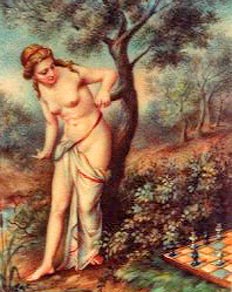|

“Caïssa represents the sacred femininity in Chess”
Caïssa, the muse of
Chess is a fictional Thracian dryad portrayed as the goddess of
Chess, as invented during the Renaissance by Italian poet Hieronymus Vida.
The name is taken from a nymph in a poem composed by Sir William Jones in 1763. It is based on Vidas
'Scacchia ludus' in which the nymph is referred to as Scacchis.

In the poem, Caïssa initially repels the advances of the god of war, Mars. Spurned, Mars seeks the aid of the god of sport Euphron, brother of Venus.
Mars asks the god of
sport to invent a game that will soften the nymphs
heart. Euphron creates the game of Chess as a gift for Mars to win Caïssa's favor.
“A lovely Dryad ranged the
Thracian wild, her air enchanting, and her aspect mild.
To chase the bounding hart was all her joy, adverse from
Hymen and the Cyprian boy. Oer hills and valleys was her beauty famed, and fair
Caïssa was the damsel named.”
|